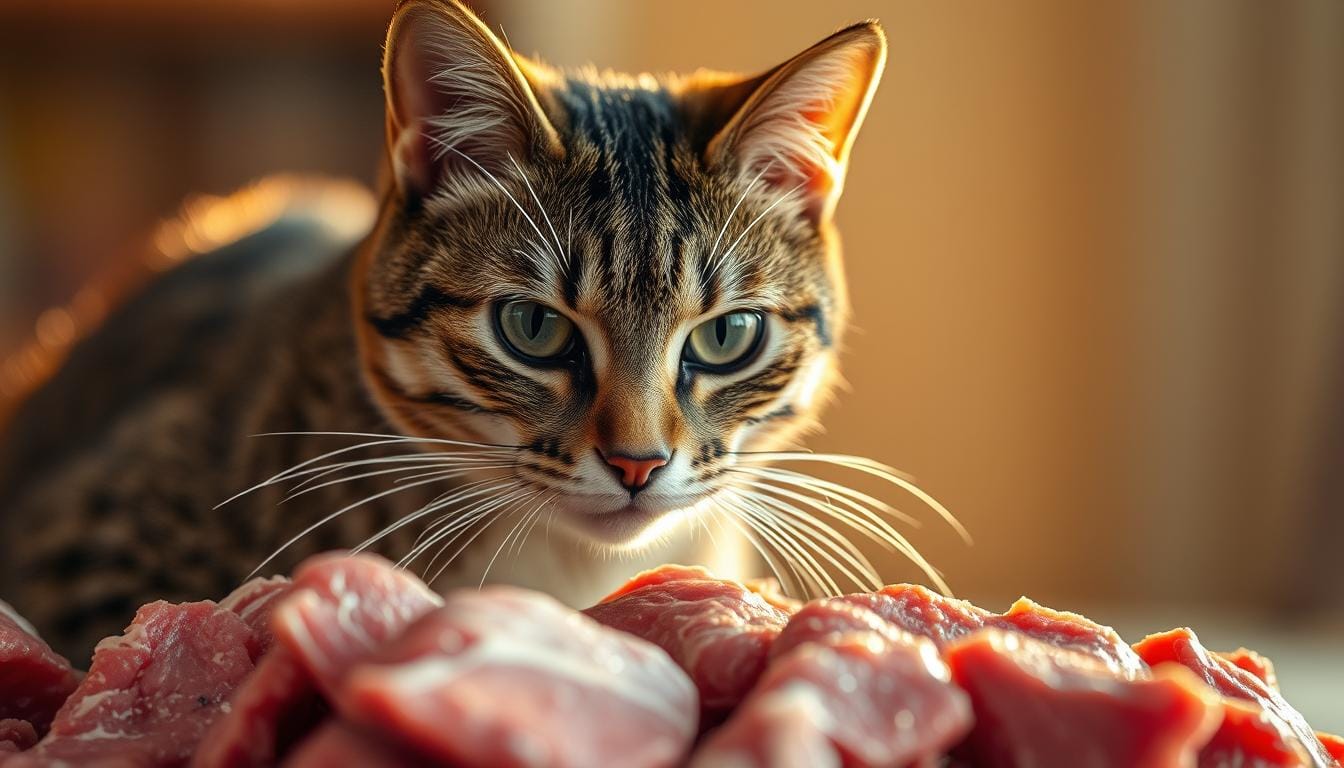
Table of Contents
Ever wondered why your cat doesn’t like veggies but loves chicken? It’s because they’re built to eat meat. Cats are not just picky; they need a meat diet to survive.
Obligate carnivores need animal tissue to live. Cats can’t live without meat. Their bodies are made to get nutrients from meat.
Cats can’t digest plant proteins or carbs like humans or dogs. They need a diet rich in proteins, vitamins, and minerals from meat. This makes them different from other animals and why they can’t eat plants.
Knowing cats are obligate carnivores helps you feed them right. Their sharp teeth and special digestive enzymes show they’re meant to eat meat.
Understanding Obligate Carnivores: A Closer Look at Feline Nature
Cats are fascinating creatures with a unique dietary need. They are obligate carnivores, meaning they need a meat-based diet to survive. Their bodies are built to process animal protein in ways other animals can’t.
Cats have been meat-eaters for millions of years. Their ancestors evolved into skilled predators. These adaptations are not just for hunting but also affect their metabolism and body functions.
Evolution of Cats as Meat Eaters
Prehistoric cats developed traits that made them great meat consumers. Their evolution included several key changes:
- Sharp, specialized teeth for tearing meat
- Highly acidic digestive systems
- Efficient protein metabolism
- Muscular bodies for hunting
Key Characteristics of Obligate Carnivores
Obligate carnivores, like cats, have unique biological traits. These traits include:
- Can’t make certain nutrients from plants
- Need vitamin A from animal tissues
- Need a lot of protein for body functions
- Can’t process many carbohydrates
Difference Between Obligate and Facultative Carnivores
Obligate carnivores need animal protein to survive. Facultative carnivores can eat plants too. Cats are obligate carnivores, needing almost all meat to stay healthy.
Nature has designed cats as precision-engineered meat-eating machines, with every biological system finely tuned to extract maximum nutrition from animal protein.
The Essential Role of Protein in Cat Nutrition
Cats are obligate carnivores, meaning they need certain nutrients found mainly in meat. Protein is key for their health and body functions. Knowing how much protein cats need is important for their well-being.
Cats need more protein than many other pets. Their bodies are made to digest animal proteins well. This makes protein essential for cats.
Minimum Protein Requirements
The amount of protein cats need changes as they grow. Here are the main protein needs:
- Growing kittens: About 240 grams of protein per kilogram of diet
- Adult cats: Around 140 grams of protein per kilogram of diet
- Senior cats: Slightly adjusted protein levels based on individual health needs
Quality of Protein Sources
Not all proteins are good for cats. They need high-quality animal-based proteins with essential amino acids. Meat like chicken, fish, and beef is best for cats.
Consequences of Protein Deficiency
Not enough protein can harm cats a lot. It can cause:
- Muscle loss
- Weakened immune system
- Poor coat and skin health
- Reduced energy levels
- Potential organ dysfunction
Meeting your cat’s protein needs helps keep them healthy and full of energy. Always talk to a vet to find the best diet for your cat.
Unique Digestive System Adaptations of Cats
Cats are obligate carnivores with special digestive systems. Their system is made for eating meat, showing their history as hunters.
The way cats digest food is really interesting. They have a short digestive tract, about 4:1 of their body length. This design helps them digest protein-rich foods well with little waste.
- Shortened intestinal length for rapid meat digestion
- Limited enzyme production for plant-based foods
- Highly specialized protein-processing mechanisms
Cats have a unique enzyme profile. They don’t have much amylase in their saliva or pancreas. This makes it hard for them to digest carbs. It shows they are true meat-eaters.
Your cat’s digestive system is amazing. It’s made for quick protein absorption. This gives them the energy they need. Their diet should be meat-based to keep them healthy.
“Nature has perfectly designed cats as precision protein-processing machines.” – Veterinary Nutrition Expert
Knowing about cats’ digestive systems helps owners choose the right food. It ensures their cats get the best diet for their needs.
Why Cats Cannot Be Vegetarians
Cats are obligate carnivores, needing specific nutrients found only in meat. Their biology is different from omnivores, making plant-based diets a big challenge.
Cats have special metabolic needs that only animal protein can meet. Their digestive system is built for meat, not plants. This makes vegetarian diets risky for their health.
Biological Limitations
Cats face several biological hurdles when trying vegetarian diets:
- They can’t make essential amino acids from plants
- They lack enzymes to turn plant nutrients into usable forms
- They need high-quality protein for their body’s functions
Essential Nutrients Found Only in Meat
Some nutrients are only in animal proteins, making meat essential for cats.
| Nutrient | Function | Meat Source |
|---|---|---|
| Taurine | Heart and eye health | Muscle meat |
| Vitamin A | Vision and immune support | Liver |
| Arachidonic Acid | Skin and coat health | Animal fat |
Vegetarian diets for cats can cause serious health issues. These include organ failure, vision problems, and even death. Your cat needs a meat-based diet to stay healthy and happy.
Critical Nutrients That Make Cats Obligate Carnivores
Cats are different from other animals because they need specific nutrients. These nutrients come only from animal sources. Knowing what these nutrients are helps us feed our cats right.
Cats need certain B vitamins for their body to work well. These include:
- Thiamin (Vitamin B1)
- Niacin (Vitamin B3)
- Pyridoxine (Vitamin B6)
- Cobalamin (Vitamin B12)
They can’t get these vitamins from plants. Vitamin B12, for example, is only in animal tissues. It’s key for their nerves and making red blood cells.
Cats also need amino acids like taurine, found only in meat. Without these, they can get very sick. Their body is made to get the most nutrition from meat, making it essential for their health.
Cats are genetically programmed to require nutrients that can only be fully obtained from animal sources.
Keeping your cat healthy means knowing their special nutritional needs. Choose foods high in meat to make sure they get everything they need for a happy life.
The Role of Taurine in Feline Health
Cats are obligate carnivores, needing special nutrients. Taurine is key for their health. Unlike many animals, cats can’t make enough taurine themselves. So, they must get it from their food to stay healthy.
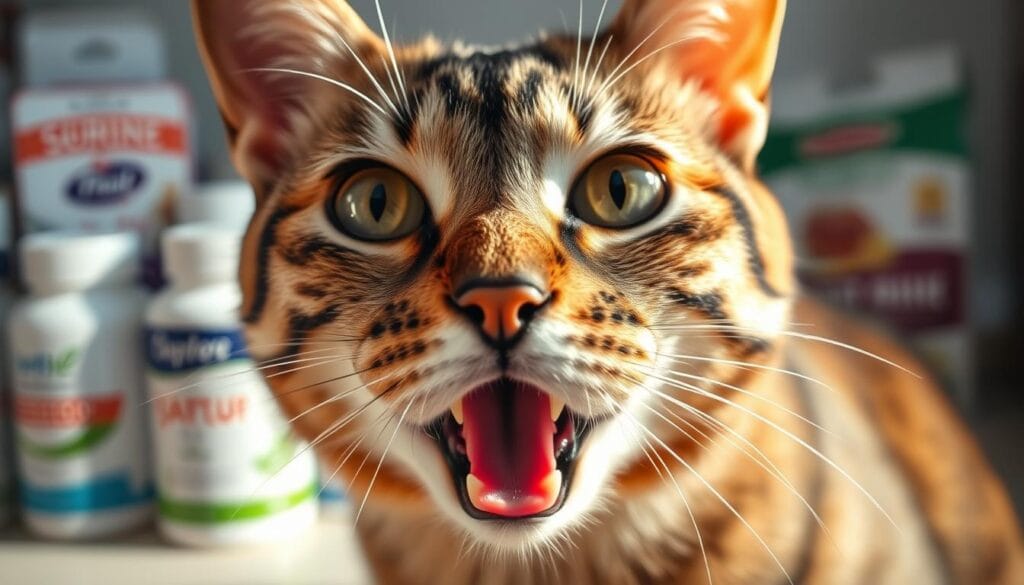
Taurine is vital for cats. It helps with many important functions. This amino acid keeps your cat healthy and happy.
Critical Functions of Taurine
- Supports cardiac muscle function
- Maintains healthy vision
- Promotes proper nervous system development
- Enhances reproductive health
- Strengthens immune system responses
Taurine Deficiency Symptoms
It’s important to know the signs of taurine deficiency in cats. Without enough taurine, cats can face serious health issues. These problems can really affect their quality of life.
| Body System | Potential Deficiency Symptoms |
|---|---|
| Cardiovascular | Dilated cardiomyopathy |
| Ocular | Retinal degeneration |
| Reproductive | Reduced fertility |
| Neurological | Decreased motor function |
Dietary Sources of Taurine
Cats get taurine mainly from animal proteins. Meat, fish, and organ meats are best for them. These foods help ensure they get enough taurine.
- Beef
- Chicken
- Fish
- Organ meats like heart and liver
Knowing how important taurine is helps cat owners choose the right food. This choice supports their pet’s health and happiness for years to come.
Anatomical Features Supporting Carnivorous Diet
Cats are amazing obligate carnivores with special body features. These features make them perfect hunters. Their bodies are designed to eat meat well, showing unique traits that differ from other animals.
Their teeth are a key sign of their meat-eating nature. Cats have sharp canines and carnassial teeth for tearing meat. These teeth help cats break down meat fast and get all the nutrients they need.
- Razor-sharp canine teeth for piercing prey
- Carnassial teeth designed for cutting meat
- Compact, muscular jaw structure
Retractable claws are another important feature for hunting. These claws stay sharp by hiding when not in use. This lets cats stalk quietly and grab prey tightly.
Their digestive system also shows their meat-eating design. Cats have a short, acidic stomach and a tight intestinal tract. This setup helps them quickly get nutrients from meat.
Nature has perfectly equipped cats as precision meat-eating machines through remarkable anatomical adaptations.
Knowing these special features helps cat owners understand their pets’ needs. It guides them in choosing the right food for their cats.
Natural Hunting Behaviors and Feeding Patterns
Cats are amazing predators with complex hunting behaviors. These behaviors are key to their survival as obligate carnivores. They are not just about hunting; they are a biological need that shapes their diet.
Knowing how cats hunt helps us understand their diet needs. These skilled hunters have evolved to catch prey efficiently. They have special adaptations for this purpose.
Prey Selection in Wild Cats
Wild cats are smart hunters. They pick their prey based on several important factors:
- Size and energy potential of the prey
- Ease of capture
- Nutritional value
- Movement patterns
They usually go for smaller prey that gives them the most energy. A single mouse can give a feral cat about 30 kilocalories. This is about 8% of their daily energy needs.
Feeding Frequency and Portions
Cats’ hunting habits affect how they eat. Unlike many animals, cats eat many small meals a day and night. This pattern is similar to their natural hunting cycles in the wild.
Domestic cats eat 10-20 small meals, just like their wild ancestors. This eating pattern keeps their metabolism high. It also meets their need for high-protein food.
Carbohydrates and Cats: Understanding the Limited Need
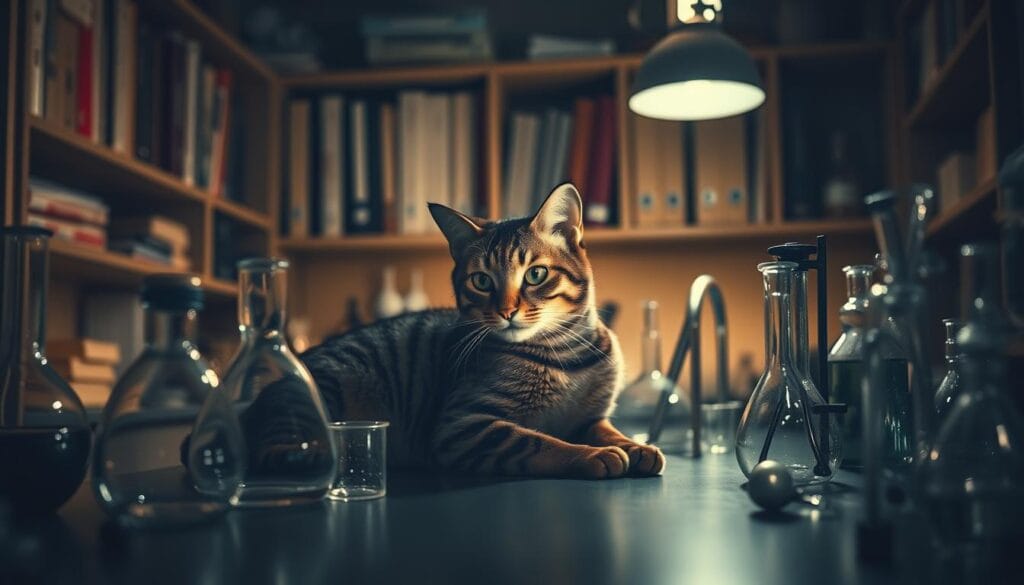
Cats are different from other animals because they need very little carbohydrates. Their bodies are made to work best with protein, not carbs. This is because they evolved to be hunters.
Unlike omnivores, cats can’t digest carbs well. They don’t have the right enzymes. This means they can’t use carbs like dogs or humans do.
- Very low liver glucokinase activity
- Limited ability to metabolize simple carbohydrates
- Minimal production of amylase enzymes
Feeding cats too many carbs can be harmful. It can make them fat, increase their chance of diabetes, and make them less healthy.
- Increased risk of obesity
- Potential development of diabetes
- Reduced nutritional efficiency
Veterinary nutritionists say cats should get only 2-10% of their calories from carbs. This shows how important protein is for cats’ health.
Nature designed cats to be meat-eaters, not grain consumers.
When picking cat food, choose options with lots of protein and few carbs. This is key to keeping your cat healthy for a long time.
Water Requirements and Hydration
It’s key to know how much water your cat needs to stay healthy. Cats, being obligate carnivores, have special hydration needs. This is because they evolved from desert-dwelling predators.
Cats get most of their water from their food. In the wild, they eat prey with lots of moisture. This helps them stay hydrated. But, domestic cats on dry food often have trouble drinking enough water.
Moisture Content in Natural Diet
Cats’ need for moisture is tied to their meat-eating nature. Wild cats eat prey with about 70-75% water. This helps them stay hydrated naturally.
- Wild prey: 70-75% moisture
- Dry cat food: 10% moisture
- Wet cat food: 75-80% moisture
Importance of Proper Hydration
Drinking enough water is crucial for cats’ health. It prevents urinary tract and kidney diseases. Since cats don’t feel thirsty often, it’s important to offer lots of water and encourage them to drink.
| Hydration Method | Effectiveness |
|---|---|
| Multiple Water Bowls | Moderate |
| Water Fountains | High |
| Wet Food Diet | Very High |
To keep your cat hydrated, try using water fountains. Also, place fresh water in many spots. And, add wet food to their diet. These steps help your cat drink like a wild cat.
Essential Vitamins and Minerals for Obligate Carnivores
Cats are obligate carnivores, needing specific nutrients found only in animal products. Their diet must include animal-based proteins. Knowing what vitamins and minerals they need is key to their health.
Cats need certain vitamins that are vital for their well-being. Unlike other animals, they can’t turn plant nutrients into what they need. Their diet must include several important vitamins:
- Vitamin A: Found in animal sources, it’s crucial for eyesight and immune health
- Vitamin D: Helps with calcium absorption and bone strength
- B-complex vitamins: These water-soluble vitamins help with metabolism and energy
Minerals are also vital for cats. Calcium and phosphorus are essential for strong bones and teeth. Meat-based diets provide these minerals best, fitting their natural needs.
Proper nutrition isn’t just about feeding your cat—it’s about providing the precise nutrients their bodies demand.
Taurine is a key nutrient for cats. It’s found in animal tissues and is vital for heart health, vision, and reproduction. Without enough taurine, cats can face serious health issues.
Veterinary nutritionists stress that cat food must be carefully made to meet these needs. Your cat’s diet should reflect what they would eat in the wild.
Common Health Issues Related to Improper Diet
Feeding cats the wrong diet can lead to serious health problems. As obligate carnivores, they need specific nutrients. Without them, they can face many health issues that affect their life quality and length.
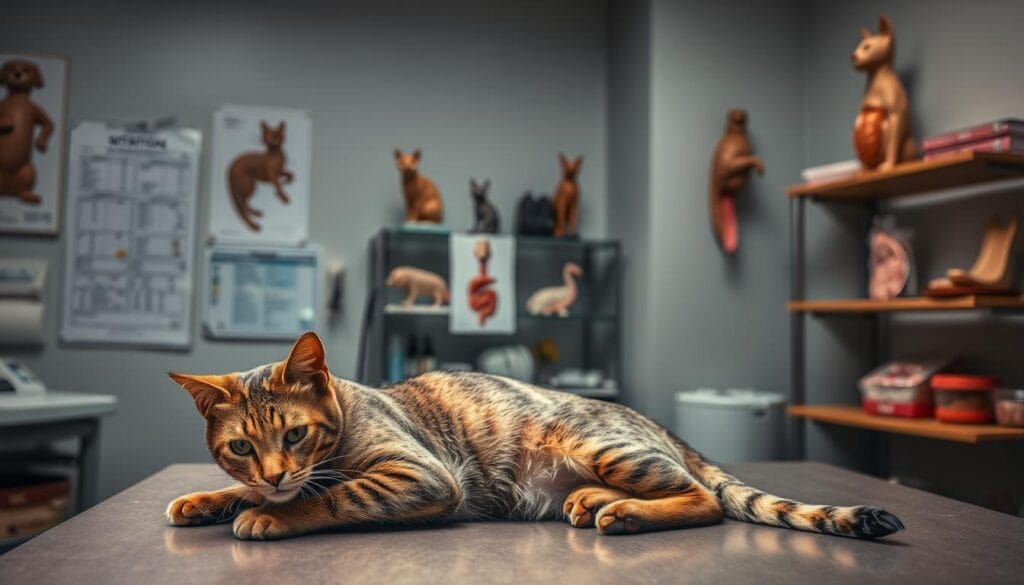
Signs of Nutritional Deficiencies
It’s important for cat owners to spot early signs of nutritional problems. These signs can show up in different ways:
- Dull or patchy coat
- Reduced energy levels
- Unexpected weight loss
- Weak immune response
- Changes in skin and fur quality
Long-term Health Impacts
Long-term, not eating the right food can cause big health problems. Certain issues can damage organs and affect the whole body.
For example, taurine deficiency can lead to:
- Central retinal degeneration
- Reproductive failure
- Feline dilated cardiomyopathy
Vitamin deficiencies can also cause problems like poor growth and weak immune systems. Your cat’s diet is crucial for their health and happiness.
Proactive nutrition management is key to preventing these serious health risks in cats.
Choosing the Right Diet for Your Cat
Choosing the right diet for your cat is key. They need a diet that matches their natural diet as obligate carnivores. This is crucial for their health.
When looking at feline nutrition, remember these important points:
- Protein should be the main focus
- Choose high-quality meat-based proteins
- Keep carbs low
- Go for moisture-rich foods
Vets give specific advice for the best cat nutrition:
| Nutrient | Recommended Percentage |
|---|---|
| Protein | 40-50% |
| Fat | 30-40% |
| Carbohydrates | Less than 10% |
Wet food is better for cats than dry kibble. Canned foods have more moisture and protein, which cats need.
When checking pet food labels, look for:
- Named meat as the first ingredient
- Little to no grain or plant-based fillers
- A complete amino acid profile
- Enough moisture
“The key to your cat’s health is understanding their biological requirement for meat-based nutrition.” – Dr. Lisa Pierson, Feline Nutrition Expert
Talk to your vet to create a diet plan for your cat. It should meet their health needs and follow their natural diet.
Commercial Cat Food vs. Natural Prey Diet
Choosing the right food for your cat is important. They need meat because they are obligate carnivores. This means picking the right cat food is key for their health.
Pet owners have two main choices: commercial cat food and a natural prey diet. Each has its own benefits and challenges for your cat’s nutrition.
Comparing Diet Strategies
- Commercial Cat Food Benefits:
- Consistent nutritional balance
- Convenient and time-saving
- Regulated by pet nutrition standards
- Natural Prey Diet Advantages:
- Mimics ancestral eating patterns
- High-quality protein sources
- Minimal processed ingredients
Making an Informed Selection
Your cat’s needs are important when choosing their diet. Factors like age, health status, and lifestyle affect what they need. Talking to a vet can help find the best diet for your cat.
Commercial cat foods are easy to use but might not be as natural as prey. Some high-end brands aim to match cats’ natural diet needs. They offer a balance between ease and nutritional value.
Conclusion
It’s key to know that cats are obligate carnivores to keep them healthy. They need a diet full of animal protein. This is because their bodies are made to eat meat, not plants.
Feeding your cat right is more than picking a food. It’s about understanding their history, how they digest food, and what they need to eat. Each meal should have high-quality protein to help them stay healthy.
Vets are your go-to for the right diet for your cat. By choosing the right food, your cat will stay healthy and full of energy. Showing you care about their meat-eating nature is the greatest love you can show.
Every cat is different, so their diet needs can change. Regular vet visits and listening to your cat’s body will help you feed them the best. This way, you’ll make sure your cat gets the nutrition they need.
FAQ
What exactly does “obligate carnivore” mean?
An obligate carnivore needs to eat mostly animal tissue to live. Cats fall into this category. They must eat meat to get nutrients their bodies can’t make from plants. Unlike omnivores, cats can’t digest plant foods well.
Can cats survive on a vegetarian diet?
No, cats can’t live on a vegetarian diet. They need nutrients found only in animal tissues. Trying to feed a cat plants can cause serious health issues, like heart disease and vision loss.
Why can’t cats digest carbohydrates effectively?
Cats can’t digest carbs well because they’re meant to eat meat. Their digestive system lacks the enzymes for plant carbs. This can lead to obesity and diabetes in cats.
How much protein do cats need in their diet?
Cats need a lot of protein, about 40-50% of their diet. Kittens, pregnant cats, and active cats need even more. The protein should come from animal sources for their health.
What is taurine, and why is it so important for cats?
Taurine is a key amino acid cats can’t make themselves. They need it for heart health, vision, and more. Cats must get taurine from animal tissues because they can’t make it from other amino acids.
How do cats’ digestive systems differ from other animals?
Cats have special digestive features for meat. Their intestines are short, stomach acidic, and enzymes are for animal protein. This helps them digest meat fast but not plants well.
Do cats need water in their diet?
Yes, cats need water, but they don’t drink much. Wet foods help keep them hydrated. Cats on dry food are at risk for dehydration and urinary problems.
What are the risks of feeding cats an inappropriate diet?
The wrong diet can harm cats a lot. It can cause protein malnutrition, taurine deficiency, and heart disease. It can also weaken their immune system and lead to organ failure.
How can I ensure my cat gets proper nutrition?
Choose high-quality cat foods that are mostly meat. They should have little carbs and lots of taurine. Make sure they’re moist and right for your cat’s age. Always talk to a vet to make sure your cat’s diet is right.



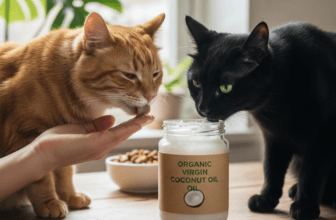
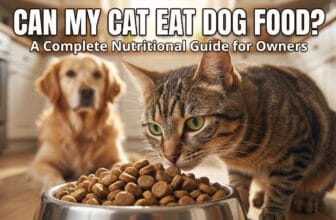



[…] are obligate carnivores, meaning their bodies are designed to thrive on animal protein. Eggs are a complete protein source, […]